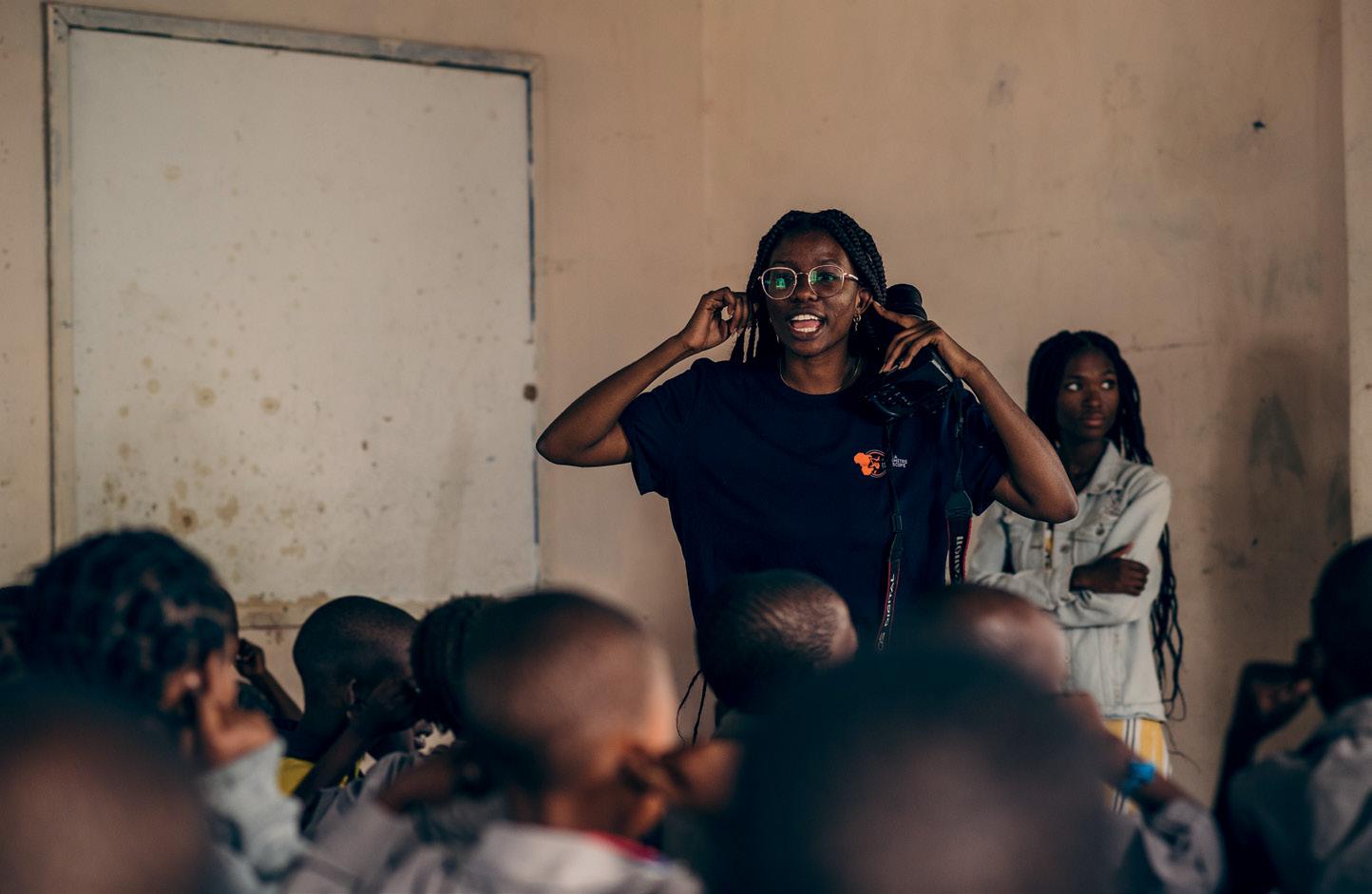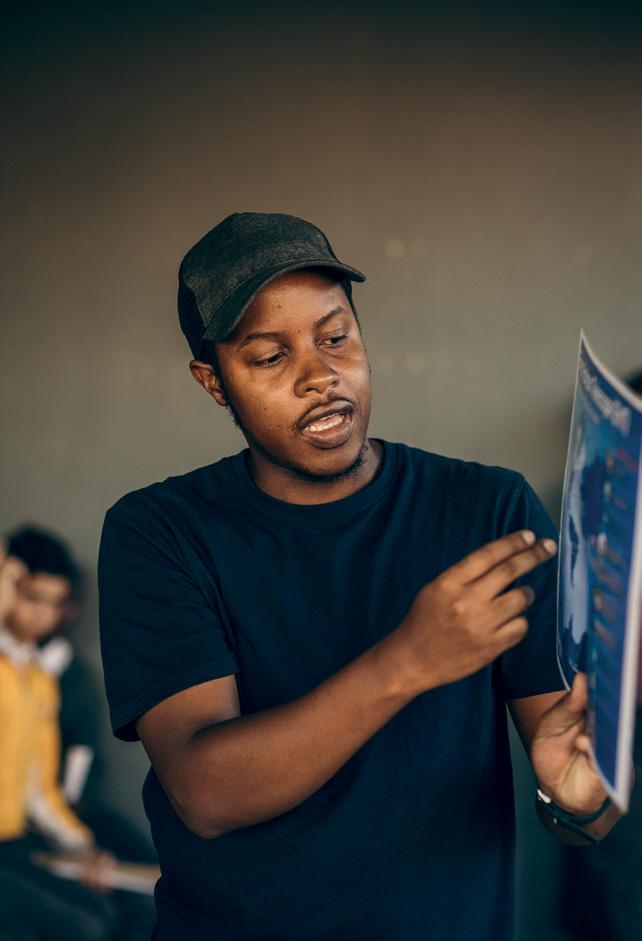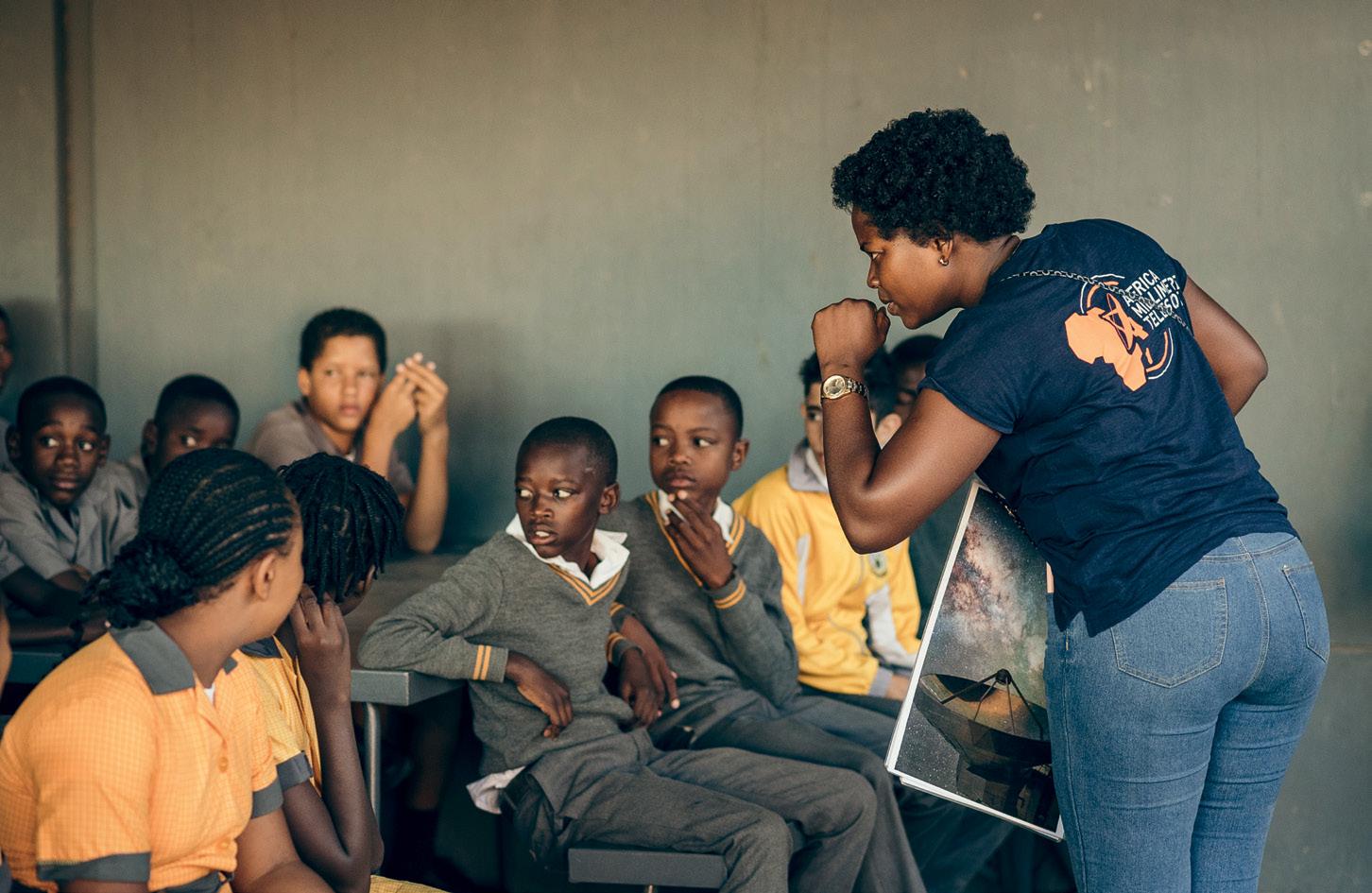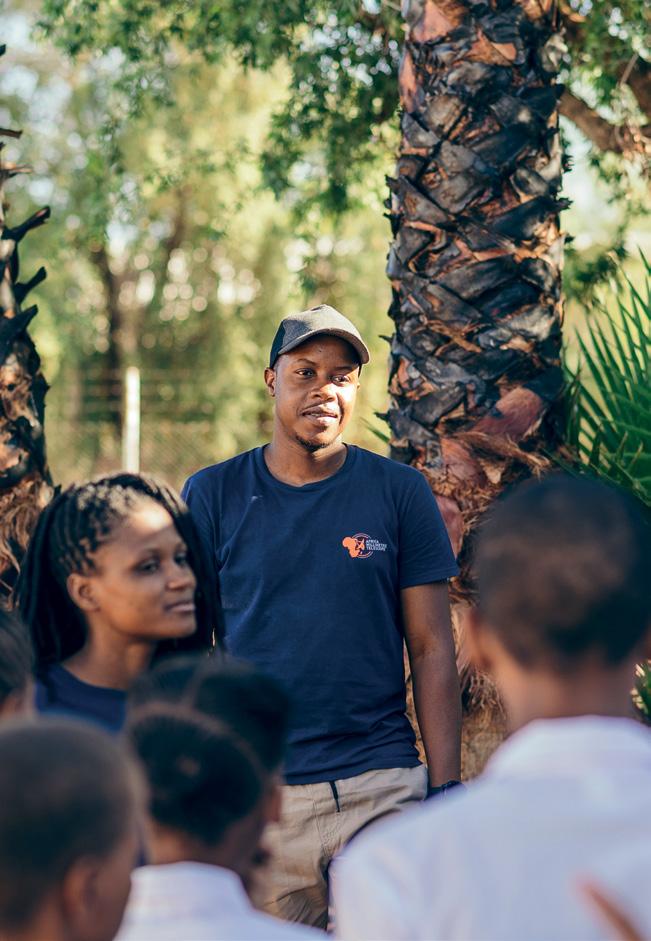
7 minute read
Inspiring Starts: The Student-Driven Success of the Africa Millimetre Telescope Project
We are halfway into 2024 and over 16,000 Namibian people have visited the mobile planetarium show of the AMT project. Now we are about to receive an international award for our efforts. On the one hand we are beyond proud and grateful about how far we have come; on the other hand we are looking forward to the future and we want to inspire even more Namibians with our space dome. Marc Klein Wolt, director of the project, sums it up: “We have only just begun. The most wonderful thing is that it’s in the hands of the students who are the ones driving it and making it possible. That’s why I am so excited about this month’s award ceremony in the UK for the Annie Maunder Medal; this award is recognition of the effort and dedication that the students have put into this project.” We asked three of our students about their “why” – what it is that drives them to do it.
“Everyone poured their hearts into this project”
Queen “Delight” Namene (23) is currently pursuing a Bachelor of Science in physics and mathematics (honours) and would love to be a lifelong student. “My mission in life is to acquire a broad range of skills and knowledge across diverse disciplines and serve as a vessel to impart it onto others,” she says. She is passionate about her work on the Africa Millimetre Telescope (AMT) mobile planetarium team. “Engaging in educational community outreach holds a special place in my heart, especially when I get to delve into topics that genuinely interest me, such as astronomy in this case.”
When she joined the team as an undergraduate, she found herself among postgraduate students, which she found slightly intimidating at the time. She decided to strive towards being the first undergraduate University of Namibia (UNAM) mobile planetarium presenter. With the invaluable assistance of her teammates, she studied astronomy and endeavoured to understand how to operate the mobile planetarium. “I took it upon myself to gather as many skills and as much knowledge as possible, aiming to serve as a valuable asset to the project and actively contribute to fulfilling the mandate of the AMT mobile planetarium project.”

Winning the Annie Maunder Medal is a humbling experience for her. “Everyone poured their hearts into this project. I believe the willingness to serve and the love for what we do led to us being awarded with this medal. We did all of these things without knowing anyone was watching.”
“Be content with the people you’ve managed to reach”
Emilia Iyambo (26) is a master student in astrophysics and has been part of the planetarium team right from the start. Winning the Annie Maunder Medal made the first half of 2024 really special for her. “We worked hard, especially last year. We tried to reach out to almost every school in Windhoek and Swakopmund, which made a huge impact.” One of the lessons she has learned so far is to not try to reach out to everyone in every school, because it is simply not possible. “Be content with the people you’ve managed to reach; the rest will follow the next time around.”
She enjoys the travelling that comes with the job. “I’ve been wanting to go to Etosha and Swakopmund for a long time and now I actually got there!” Emilia learned a lot about herself and about people in general. “People are so amazed when attending one of our shows. I’ve come to realise that so many people, children and grown-ups, don’t know much about physics and astronomy. It’s what keeps me going: knowing that we are doing something so impactful for many people; they all enjoy it so much.”
Emilia is a smart, hard-working student who is eager to learn more. It’s not easy, though. “In my case it’s a bit hard, especially last year was a bit hectic, despite all the fun we had. I pay my university tuition myself, so I had to look for a job to do that. It was quite stressful to work on my research, the planetarium and look for another job as well. I worked full time with the planetarium only for half a year, as I also worked full time as a teacher and prepared my lessons until five. When I came home, I ate something and then worked on my research. Being part of the team takes so much of our time, but we do it out of love, which makes it easy to do. Even when we don’t need to, we still want to be there and be part of it.”

“I am even more in awe”
Hiiko Hingo Hingo (29) started off by doing an honours degree in physics, then completed his Masters of Science in physics and recently started as the second AMT PhD fellow at UNAM. “My interest in physics and astronomy has always been there, because of the night sky above Namibia. After high school I started studying engineering. I basically ran into an amazing astronomy community here and I fell more and more in love with astronomy. Most Namibians are so unaware of astronomy, even myself. At UNAM I found out how great it is.”
Hiiko feels the planetarium project won the Annie Maunder Medal because this project is totally different from anything else on the African continent. “What we do has had a lot of impact on many people in a brief period of time; that gave us some advantage. Also, we focus on the less privileged people in our country. I was positively surprised by so much recognition in such a short time!”
The planetarium show that stood out for Hiiko was the one in Lüderitz in November 2023. “We met this kid who was an absolute genius. He asked us how light gets curved, and he never seemed satisfied with our answers. In the end we had to call our project director, Marc, from a restaurant to get the right answer. All the people there were watching and listening to this kid having this really complex conversation on the phone. We do have a lot of smart kids in our country, and we want all of them to know that studying something like astronomy is within reach for them too.”
We poured our hearts into this, without knowing anyone was watching.

“The work in the outreach team is quite enjoyable,” Hiiko says with a convincing smile. “Knowing you’re having an impact on someone else’s future is cool! Doing it as a team makes it exciting; we always look forward to travelling with each other, seeing new faces and new places. I would love to continue doing so for as long as possible.” He was thrilled that by being part of the team, he got to do an extra astronomy course for free.
At night, you can find Hiiko outside. “Now that I am an astronomer, I look at the night sky differently. I am usually outside at night, looking at satellites, stars, planets… Now that I sort of understand the unbelievable stuff that’s happening out there, I am even more in awe.”
- Barbara Kerkhof
The Africa Millimetre Telescope (AMT) is a project run by Radboud University (The Netherlands) and the University of Namibia for building a 15-metre-large radio telescope on or near Gamsberg Mountain. This telescope will be unique in its kind, as it is set to be the first completely newly built facility to be part of the Event Horizon Telescope (EHT) – the project that realised the historical first image of a black hole, and it will be the only telescope of its kind in the whole of Africa. An integral part of the AMT project is a social programme which includes a mobile planetarium – an inflatable dome that can host up to 30 kids at a time and in which shows about the wonders of the universe are displayed in an interactive way. FlyNamibia, together with Nedbank, Gondwana, Lithon Foundation, Minds in Action, Ineos Grenadiers, the Namibia Scientific Society, GREE, Perfect Glass and Eduvision are proud sponsors of the AMT mobile planetarium.










